In the Still of the Night Read online
Page 2
Judge Richard Hicks, who was a superior court judge in Thurston County (just north of Lewis County), had been summoned to preside over this hearing. He was the epitome of what laymen expect a judge to look like--a husky man with a shock of white hair and a beard to match, his eyes missing nothing as he peered through black-rimmed glasses. Although he could be jovial, there was no doubt that he was in complete control of this courtroom. He was also bending over backward to follow all the rules of trials held in Lewis County, right down to the usual court hours.
Initially, Judge Hicks had been appointed as the sole authority who would decide whether Coroner Wilson had been derelict in his duty and/or mismanaged the investigation into Ronda Reynold's sudden death. But Hicks chose to add a twelve-person jury. The opposing attorneys--Royce Ferguson, representing Barb Thompson, and John Justice, who had been retained by the Lewis County prosecutor's office to represent Terry Wilson--chose eight women, four men, and two alternates to listen to the witnesses, hear the circumstantial evidence surrounding Ronda's death, and view the physical evidence. They would render a verdict, but it might be moot; if he didn't agree with them, Judge Hicks still held the option to overrule their decision.
Attorneys, police officers, and even coroners from other counties observed the action in this starkly modern, windowless courtroom with its original rock-hard oak benches. If they scrunched together, as many as 180 spectators could fit onto those benches. Whatever the verdict would be about Coroner Wilson's responsibility in this still-unsolved death, this was a landmark case. Newspapers and television reporters disseminated the testimony from Seattle to Portland each day.
I had followed the violent and mystifying death of Ronda Reynolds since it occurred, and was as curious as everyone else. Naturally, I was anxious to hear the witnesses' testimony, consider the circumstantial evidence--which was rumored to be weighted heavily against suicide--and see what physical evidence might be accepted by the Court. Several copies of a shiny white binder about six inches thick that appeared to be a collection of police reports, statements, and photos spurred curiosity in the gallery and the media. One copy sat on the plaintiff's table, and another on the defense's.
What was in it? I wondered. If Judge Hicks should accept the material in that binder into evidence, I would find out. I wanted to read each page.
Yet whatever results would emanate from this hearing, they wouldn't change my mind about writing a book about Ronda's death. There were almost as many sides to this story as colored glass splinters in a kaleidoscope. I didn't know if I would be writing about a brutal crime, a pitiful suicide, or something else. I knew only that sometimes everything has to be told, no matter how embarrassing or distasteful the truth may be. There is never real closure for those who lose someone they love to violence, or for those who have had the white light of suspicion focused on them for decades.
So attention must be paid.
I know my readers, and I know that most of them are well-read and often sharp amateur sleuths. In the death of Ronda Reynolds, they may make the final decision on guilt or innocence. For almost twelve years, I have tried to work my way through the tangled mass of statements and leads.
In the end, I hope to present all sides of this haunting case, even though I suspected early on that there would be some principal players who might not talk to me at all.
As it happened, I was right.
EVEN THOSE WHO VIEW a glass as half full have moments when they wonder if their lives are too perfect to last. For some, the warm, wafting breezes of spring, redolent with the fragrance of flowers, are difficult; there is too much nostalgia to deal with. For others, a new love can bring with it a fear of losing something more precious than they ever could have imagined. Similarly, holidays are times fraught with tension for many people.
Everyone hopes for a warm and loving gathering of family and friends, doors locked against the outside world once everyone arrives. And yet there is an almost subliminal fear that someone we love could be in an accident on the way to Grandmother's house or wherever the celebration is to be held.
At Thanksgiving and Christmas, weather conditions can be icy and stormy, making roads dangerous to traverse and weighing down the wings of planes.
We worry, usually silently, and watch the clock until our roll call is complete. To lose someone on a holiday means that every anniversary that comes after will be marked by sorrowful remembrance.
I suspect that mothers agonize the most. Even when our children are grown, we would much prefer them to be safe beneath our wings, and sometimes we long for the days when we could tuck them into cribs and know that we were there to protect them from any harm.
Barb Thompson was like that, even though she seldom betrayed her concern. She wanted her two children to grow up, realize their dreams, and fly free. By the 1990s, she had let go of her babies, as all good mothers have to. She was confident that they were independent and fully capable adults, able to take care of themselves.
And they hadn't let her down; her daughter, Ronda, in her thirties, had been a Washington State Patrol trooper for almost a decade, for heaven's sake, responsible for the safety of others as well as herself. If she couldn't take care of herself, what woman could?
Barb's son, Freeman, was ten years younger than Ronda. Barb was very young when Ronda was born, only nineteen, and it probably was just as well that she had only her daughter to raise then. It wasn't easy for Barb. Bringing up her children on her own much of the time was a challenge. Nevertheless, Barbara always put them first, and she usually worked two--or even three--jobs to support them.
Although she and her mother, Virginia Ramsey, had tangled often when she was a child and a teenager, it was Virginia who became Barb's strongest support. Virginia had been married for more than twenty years to the only man she had ever loved, bringing up three children on "less than a shoestring," when Barb's father deserted her for another woman. She was totally devastated.
"Somehow," Barb recalled, "Ronda's birth gave her a reason to go on, and I sure did need her. She took care of Ronda--and, later, Freeman--while I worked as many jobs as I could, helped me raise my little girl. She never complained. My mom was always there--and Ronda cherished her grandmother."
Although Ronda was born two months premature--with no fingernails, eyebrows, or lashes yet--she was a pretty, serene baby and she was easy to care for from the moment Barb took her home from the hospital in Southern California in September 1965.
Barb married twice, and had romantic relationships from time to time, but the core of her family was her children--Ronda and Freeman--and her mother, Virginia. They saw each other through many hard times and always emerged together.
Ronda loved horses as much as Barb did, but she had another dream for her life. Ever since she was about five, she had watched Dragnet, Adam-12, and Mayberry R.F.D. avidly. She decided then that she would be a law enforcement officer--a sheriff, maybe, or a detective. In fact, she wanted to grow up to be a Washington State Patrol trooper. At the time, that seemed unlikely; there were no female officers when Ronda was a little girl. There weren't even any short troopers. The image of the Washington State Patrol was one of tall men wearing blue-gray uniforms and wide-brimmed hats. (In many ways, it still is, and motorists are surprised to be stopped by small women with soft voices.)
Barb figured she would grow out of that, but Ronda never wavered. Although she was a very feminine little girl, she loved riding wildly on her horse, and was fascinated with police officers.
Nothing daunted Ronda. She took on challenges all of her life, and as she grew up, she knew that women were beginning to take their place beside men in law enforcement. She never gave up on her plans to be a trooper, although she could not have imagined some of the problems her femininity would bring in a male world.
The lovely girl from Eastern Washington wanted it all--as people tend to say about women who work and hope to have a family home life, too.
Ronda wanted to marry one day and, especi
ally, to have children.
And she almost achieved it all. She shared many characteristics with her mother, but perhaps the strongest was that they were both stubborn and single-minded. Each of them had had to face more than most women could imagine, but they didn't give up on improbable or impossible goals, despite all the naysayers who warned them they couldn't win.
Like all other mothers and daughters, they had some arguments when Ronda went through her teen years, but they loved each other devotedly. Ronda respected her mother and appreciated the sacrifices she had made, and the long hours she'd worked over the years.
IT WAS WEDNESDAY, December 16, 1998, nine days before Christmas. Ronda lived over on what Washingtonians call "the coast," and the rest of her family lived three hundred miles away in Spokane. Barbara was looking forward to a five-day visit from Ronda, as were her grandmother and brother. It wouldn't exactly be a Norman Rockwell Christmas, although Spokane could count on snow. It was far colder in Eastern Washington than it was in Seattle.
Ronda's visit wasn't really to celebrate the holiday; she was going home to those who loved her for comfort and advice. Her second marriage was ending, and although she had no trouble finding a job, none of them was what she had wanted for most of her life. A few years earlier, after eight years as a Washington state trooper, she had resigned from the force. In her mind, she had had no choice, but she grieved for the career she loved more than any other.
Twenty-some years ago, there were only about thirty-five female Washington state troopers; today there are 1,200 sworn officers in the state patrol and 5 percent of them are women, about sixty of them. That didn't matter to Ronda; she always assumed that she would be one of the small percentage of women who made it.
And she was right. With her grades in high school and community college close to a 4.0 GPA, she was a shoo-in. Well, not quite. The state patrol winnowed out applicants scrupulously. Candidates had to be nineteen and a half years old, with 20/25 vision and their weight proportionate to their height. Ronda met all those requirements, too.
They could not have felony convictions or misdemeanor convictions involving theft, crimes of violence, assault on a family member, larceny, moral turpitude, controlled substances, or hit-and-run accidents.
Any prior conviction for driving under the influence of alcohol or drugs had to be at least seven years in the past. When they met all those standards, the few applicants who emerged were required to pass a fitness and agility test. Perhaps more important, they would be subjected to a background investigation, and then had to successfully pass a polygraph examination.
Ronda sailed through; her record was pristine. Having chosen her career when she was in grade school, she'd been careful to live the kind of life that the state patrol wanted to find when they did background checks on prospective new hires.
Ronda was welcomed as the youngest female cadet ever hired. She was twenty, and her life was turning out just as she hoped it would.
Cadets must go through eight months of grueling training before they can hope to become road-worthy troopers. Their "boot camp" in Shelton, Washington, is similar to Army and Marine Corps training. They are often wakened in the wee hours of the morning, grabbed out of their cots by the ankles, and held upside down. They are ordered to do push-ups in the mud and cold rain long before the sun comes up, and to jog in the dark.
The WSP cadets are always at the bottom of the totem pole. As they toughen up, they derisively call the Criminal Justice Training Center law enforcement students from other departments "Club Med members." Part of Washington state's training for young police officers involves traveling from the Burien training academy and spending time at the state patrol's Shelton academy to focus on driving skills.
"They weren't nearly as military as we were," a ten-year female veteran of the state patrol recalls. "And they were nowhere near as disciplined as our group of cadets. We kind of resented them because whenever there were visiting students, we had to 'step back' and let them eat first. Lots of times, we were the last to eat."
About a third of Washington State Patrol cadets failed to finish the eight-month training program. They washed out for a variety of reasons: some for ethical standards that didn't meet the Patrol's level, some because they couldn't grasp the defense tactics that they had to learn before they could go out on dark roads in one-man cars and face who knows what. Some couldn't take the lack of sleep, the physical demands, and the harassment.
But Ronda could.
I myself have worked a one-man car--back in the day--and it can get lonely and scary out there. Being a patrol trooper is, in many ways, more dangerous than being a detective in the Women's Bureau of the Seattle Police Department, as I was when I was her age. Washington state permits windows that are tinted so darkly that an officer cannot see who is inside. It takes a sixth sense, faith, and caution for troopers to stop a car where the driver and passengers are virtually invisible. Some of the most benign-appearing drivers, pulled over for a burned-out taillight or for driving only a few miles over the speed limit, can turn out to be killers on the run.
Ronda entered the Washington State Patrol academy on September 8, 1987, and with credit for her earlier years as a trooper cadet in her teens, she became a commissioned trooper on January 8, 1988. She stood proudly in her new uniform in the rotunda of the state Capitol in Olympia as then Governor Booth Gardner shook her hand and camera flashes highlighted her new badge: #954.
Her first assignment was to patrol I-5, the busiest highway in Washington State, near the Seattle Detachment. Next she went to the Grays Harbor WSP detachment in Aberdeen. These were early days in the history of females on the Washington State Patrol, and Ronda deliberately armed herself with a protective emotional shield, appearing far tougher than she really was. Her close women friends knew that she was loving, vulnerable, and often "grossed out" by some of the jokes and remarks the men went out of their way to tell.
But Ronda didn't show it.
Connie Riker worked as a dispatcher for the Patrol in Bremerton, and her territory--#8--consisted of many counties, including Clallam, Jefferson, Wahkiakum, and Grays Harbor. She met Ronda when she and another trooper had a delivery to make in Aberdeen. It wasn't long before Connie and Ronda became fast friends. On occasion, Connie rode along with Ronda in what was usually her "one-man car."
Connie was appalled at the lewd comments and forbidden jokes that Ronda had to put up with. "There was a huge sexual harassment problem in the Patrol then, but Ronda felt she had to get along with the guys--and she could put on a different persona when she was around them. The guys were used to 'taking care' of women--which was kind of the opposite of their naughty stories--but Ronda didn't want to be taken care of. She was so strong.
"If Ronda was a man, you would call her 'cocky,' " Connie explained. "She believed she could do anything then. And she was so empowering to me. She told me the Aberdeen Police was hiring, and that she could introduce me to the chief. I remember how she said, 'Connie, you can do this. You will be great!' "
She mentored me, and she once said, 'Yeah, you have to put up with a lot of crap working with a bunch of men,' and then she said, 'But won't it be cool to break the "no females" barrier in Aberdeen?'"
Inspired, Connie applied to the Aberdeen Police Department, passed all the tests and interviews, and was offered a job as a police officer. She and Ronda were both thrilled.
"But I injured my knee," Connie said, "and I couldn't take the job. And then I got cancer. I lost touch with Ronda after I was transferred to Tacoma for six months. Later, I went to the Department of Licensing."
Connie Riker and Ronda Thompson both loved horses and that gave them an additional bond during the time they both lived in Grays Harbor County.
Connie still remembered how happy Ronda was the early summer she married another Washington state trooper, Mark Liburdi, and they moved to a wonderful horse farm in McCleary. Ronda loved Mark's three kids, and the newly married couple seemed to get along well. She a
sked the Patrol to officially change her name to Ronda Liburdi.
"Their house was so very neat," Connie recalled. "I finally said, 'How do you do it? You're both too busy to keep it this clean!' "
The ranch house was sparely and purposely furnished. Connie saw that Ronda liked nice things, and she chose quality rather than quantity.
On their ride-alongs, Ronda and Connie talked through the nights, especially when there were few calls from dispatch.
"She had a wonderful personality, so giving," Connie said. "One thing about Ronda--as tough as she could seem to be, she needed a man in her life. She was very pretty and she seemed always to have a boyfriend, but once she met Mark, she expected to be with him forever."
Would Ronda commit suicide? It was a question that always came up when I was talking to her old friends and working partners.
"No!" Connie shouted. "In order for Ronda to have killed herself, she would have had to have a complete personality replacement. She was very strong. She ran the domestic violence program in Lewis County, and she wanted to believe in the people she loved. I've seen suicides in my own family, and Ronda just wasn't like that. Whatever happened, she would have gone on to the next phase of her life. She wouldn't give up."
Ronda had a number of close women friends, possibly because she didn't feel any need to compete with them; she wanted them to be successful, too. Another was Claudia Self, who worked in the Grays Harbor County Prosecutor's Office.
Claudia offered to help Ronda fill out follow-up and field investigation reports. Ronda was a rookie then, and the reports had to be perfect because they were often used in trials or other legal hearings. Claudia empathized easily with Ronda when it came to working as the lone woman in a domain mostly populated by males. She had hired on as an officer in Idaho, and she too had lived through the not-so-subtle repartee and sexual innuendo--and sometimes outright inappropriate touching--that Ronda faced.

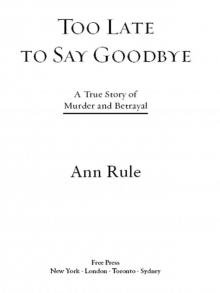 Too Late to Say Goodbye: A True Story of Murder and Betrayal
Too Late to Say Goodbye: A True Story of Murder and Betrayal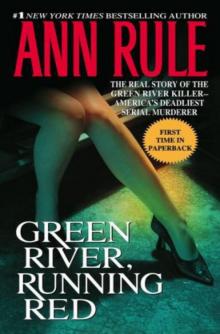 Green River, Running Red
Green River, Running Red Bitter Harvest
Bitter Harvest Dead by Sunset: Perfect Husband, Perfect Killer?
Dead by Sunset: Perfect Husband, Perfect Killer?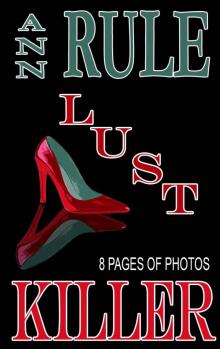 Lust Killer
Lust Killer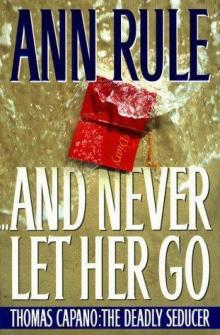 And Never Let Her Go: Thomas Capano: The Deadly Seducer
And Never Let Her Go: Thomas Capano: The Deadly Seducer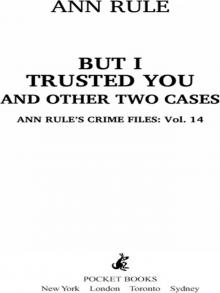 But I Trusted You and Other True Cases
But I Trusted You and Other True Cases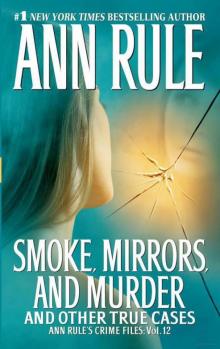 Smoke, Mirrors, and Murder and Other True Cases
Smoke, Mirrors, and Murder and Other True Cases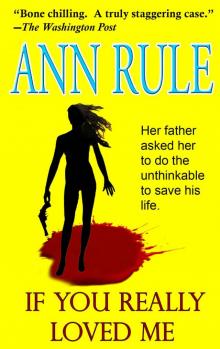 If You Really Loved Me
If You Really Loved Me Kiss Me, Kill Me and Other True Cases
Kiss Me, Kill Me and Other True Cases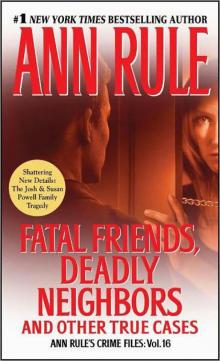 Fatal Friends, Deadly Neighbors and Other True Cases
Fatal Friends, Deadly Neighbors and Other True Cases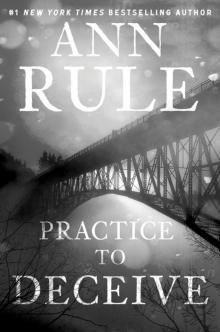 Practice to Deceive
Practice to Deceive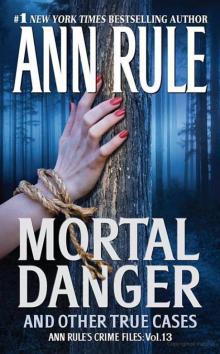 Mortal Danger and Other True Cases
Mortal Danger and Other True Cases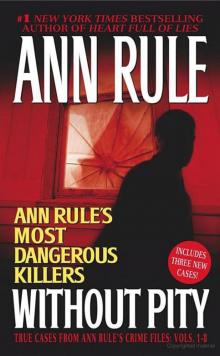 Without Pity: Ann Rule's Most Dangerous Killers
Without Pity: Ann Rule's Most Dangerous Killers Everything She Ever Wanted
Everything She Ever Wanted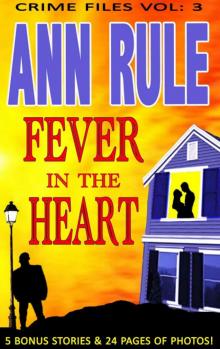 A Fever in the Heart and Other True Cases
A Fever in the Heart and Other True Cases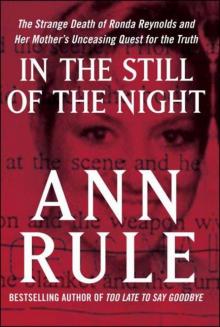 In the Still of the Night
In the Still of the Night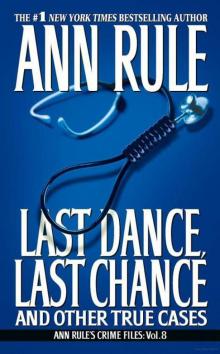 LAST DANCE, LAST CHANCE - and Other True Cases
LAST DANCE, LAST CHANCE - and Other True Cases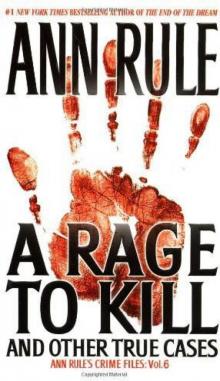 A Rage to Kill
A Rage to Kill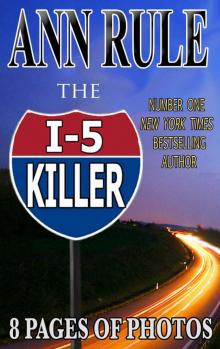 The I-5 Killer
The I-5 Killer The Stranger Beside Me
The Stranger Beside Me Everything She Ever Wanted: A True Story of Obsessive Love, Murder, and Betrayal
Everything She Ever Wanted: A True Story of Obsessive Love, Murder, and Betrayal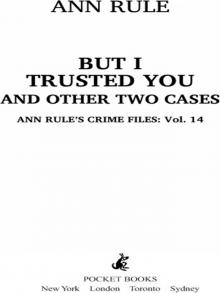 But I Trusted You
But I Trusted You Without Pity
Without Pity Kiss Me, Kill Me
Kiss Me, Kill Me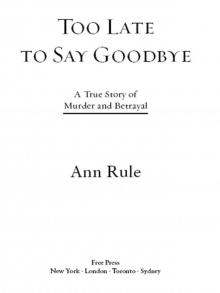 Too Late to Say Goodbye
Too Late to Say Goodbye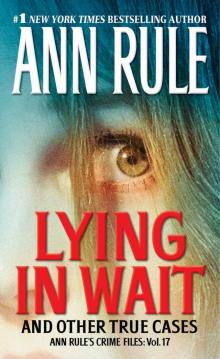 Lying in Wait
Lying in Wait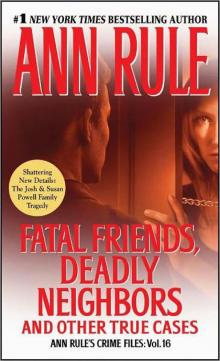 Fatal Friends, Deadly Neighbors
Fatal Friends, Deadly Neighbors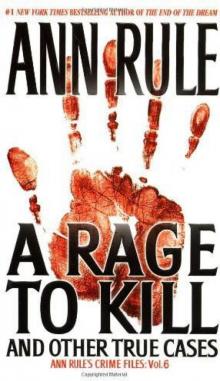 A Rage to Kill: And Other True Cases
A Rage to Kill: And Other True Cases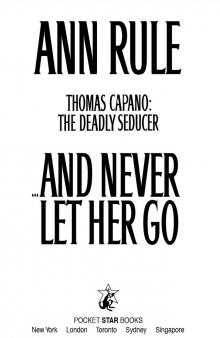 And Never Let Her Go
And Never Let Her Go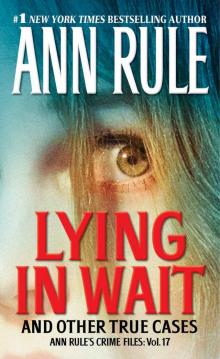 Lying in Wait Ann Rule's Crime Files Vol.17
Lying in Wait Ann Rule's Crime Files Vol.17 Blood Secrets: Chronicles of a Crime Scene Reconstructionist
Blood Secrets: Chronicles of a Crime Scene Reconstructionist No Regrets
No Regrets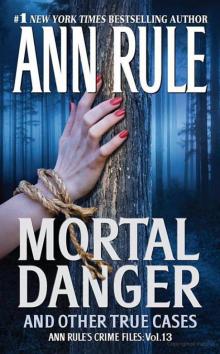 Mortal Danger
Mortal Danger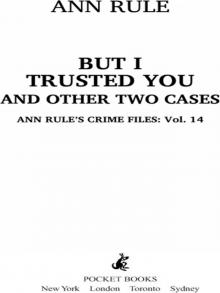 But I Trusted You: Ann Rule's Crime Files #14
But I Trusted You: Ann Rule's Crime Files #14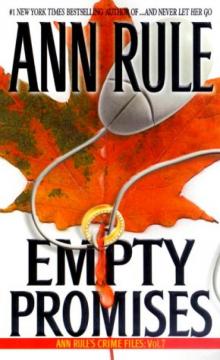 Empty Promises
Empty Promises Dead by Sunset
Dead by Sunset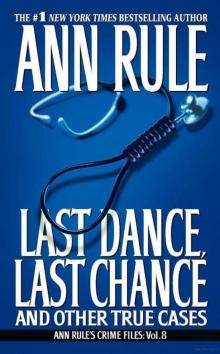 Last Dance, Last Chance
Last Dance, Last Chance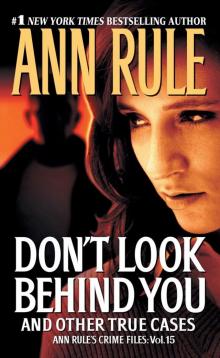 Don't Look Behind You
Don't Look Behind You